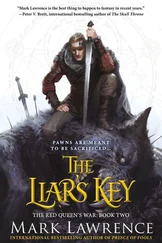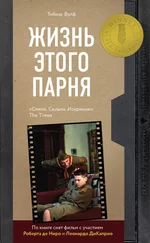Тобиас Вулф - The Liar
Здесь есть возможность читать онлайн «Тобиас Вулф - The Liar» весь текст электронной книги совершенно бесплатно (целиком полную версию без сокращений). В некоторых случаях можно слушать аудио, скачать через торрент в формате fb2 и присутствует краткое содержание. Жанр: Проза, на английском языке. Описание произведения, (предисловие) а так же отзывы посетителей доступны на портале библиотеки ЛибКат.
- Название:The Liar
- Автор:
- Жанр:
- Год:неизвестен
- ISBN:нет данных
- Рейтинг книги:3 / 5. Голосов: 1
-
Избранное:Добавить в избранное
- Отзывы:
-
Ваша оценка:
- 60
- 1
- 2
- 3
- 4
- 5
The Liar: краткое содержание, описание и аннотация
Предлагаем к чтению аннотацию, описание, краткое содержание или предисловие (зависит от того, что написал сам автор книги «The Liar»). Если вы не нашли необходимую информацию о книге — напишите в комментариях, мы постараемся отыскать её.
The Liar — читать онлайн бесплатно полную книгу (весь текст) целиком
Ниже представлен текст книги, разбитый по страницам. Система сохранения места последней прочитанной страницы, позволяет с удобством читать онлайн бесплатно книгу «The Liar», без необходимости каждый раз заново искать на чём Вы остановились. Поставьте закладку, и сможете в любой момент перейти на страницу, на которой закончили чтение.
Интервал:
Закладка:
“Mother,” I said, coming into the living room, “I’m sorry about the letter. I really am.”
She was arranging wood in the fireplace and did not look at me or speak for a moment. Finally she finished and straightened up and brushed her hands. She stepped back and looked at the fire she had laid. “That’s all right,” she said. “Not bad for a consumptive.”
“Mother, I’m sorry.”
“Sorry? Sorry you wrote it or sorry I found it?”
“I wasn’t going to mail it. It was a sort of joke.”
“Ha ha.” She took up the whisk broom and swept bits of bark into the fireplace, then closed the drapes and settled on the couch. “Sit down,” she said. She crossed her legs. “Listen, do I give you advice all the time?”
“Yes.”
“I do?”
I nodded.
“Well, that doesn’t make any difference. I’m supposed to. I’m your mother. I’m going to give you some more advice, for your own good. You don’t have to make all these things up, James. They’ll happen anyway.” She picked at the hem of her skirt. “Do you understand what I’m saying?”
“I think so.”
“You’re cheating yourself, that’s what I’m trying to tell you. When you get to be my age you won’t know anything at all about life. All you’ll know is what you’ve made up.”
I thought about that. It seemed logical.
She went on. “I think maybe you need to get out of yourself more. Think more about other people.”
The doorbell rang.
“Go see who it is,” Mother said. “We’ll talk about this later.”
It was Dr. Murphy. He and Mother made their apologies and she insisted that he stay for dinner. I went to the kitchen to fetch ice for their drinks, and when I returned they were talking about me. I sat on the sofa and listened. Dr. Murphy was telling Mother not to worry. “James is a good boy,” he said. “I’ve been thinking about my oldest, Terry. He’s not really dishonest, you know, but he’s not really honest either. I can’t seem to reach him. At least James isn’t furtive.”
“No,” Mother said, “he’s never been furtive.”
Dr. Murphy clasped his hands between his knees and stared at them. “Well, that’s Terry. Furtive.”
Before we sat down to dinner Mother said grace; Dr. Murphy bowed his head and closed his eyes and crossed himself at the end, though he had lost his faith in college. When he told me that, during one of our meetings, in just those words, I had the picture of a raincoat hanging by itself outside a dining hall. He drank a good deal of wine and persistently turned the conversation to the subject of his relationship with Terry. He admitted that he had come to dislike the boy. Then he mentioned several patients of his by name, some of them known to Mother and me, and said that he disliked them too. He used the word “dislike” with relish, like someone on a diet permitting himself a single potato chip. “I don’t know what I’ve done wrong,” he said abruptly, and with reference to no particular thing. “Then again maybe I haven’t done anything wrong. I don’t know what to think anymore. Nobody does.”
“I know what to think,” Mother said.
“So does the solipsist. How can you prove to a solipsist that he’s not creating the rest of us?”
This was one of Dr. Murphy’s favorite riddles, and almost any pretext was sufficient for him to trot it out. He was a child with a card trick.
“Send him to bed without dinner,” Mother said. “Let him create that.”
Dr. Murphy suddenly turned to me. “Why do you do it?” he asked. It was a pure question, it had no object beyond the satisfaction of his curiosity. Mother looked at me and there was the same curiosity in her face.
“I don’t know,” I said, and that was the truth.
Dr. Murphy nodded, not because he had anticipated my answer but because he accepted it. “Is it fun?”
“No, it’s not fun. I can’t explain.”
“Why is it all so sad?” Mother asked. “Why all the diseases?”
“Maybe,” Dr. Murphy said, “sad things are more interesting.”
“Not to me,” Mother said.
“Not to me, either,” I said. “It just comes out that way.”
After dinner Dr. Murphy asked Mother to play the piano. He particularly wanted to sing “Come Home, Abbie, the Light’s on the Stair.”
“That old thing,” Mother said. She stood and folded her napkin deliberately and we followed her into the living room. Dr. Murphy stood behind her as she warmed up. Then they sang “Come Home, Abbie, the Light’s on the Stair,” and I watched him stare down at Mother intently, as if he were trying to remember something. Her own eyes were closed. After that they sang “0 Magnum Mysterium.” They sang it in parts and I regretted that I had no voice, it sounded so good.
“Come on, James,” Dr. Murphy said as Mother played the last chords. “These old tunes not good enough for you?”
“He just can’t sing,” Mother said.
When Dr. Murphy left, Mother lit the fire and made more coffee. She slouched down in the big chair, sticking her legs straight out and moving her feet back and forth. “That was fun,” she said.
“Did you and Father ever do things like that?”
“A few times, when we were first going out. I don’t think he really enjoyed it. He was like you.”
I wondered if Mother and Father had had a good marriage. He admired her and liked to look at her; every night at dinner he had us move the candlesticks slightly to right and left of center so he could see her down the length of the table. And every evening when she set the table she put them in the center again. She didn’t seem to miss him very much. But I wouldn’t really have known if she did, and anyway I didn’t miss him all that much myself, not the way I had. Most of the time I thought about other things.
“James?”
I waited.
“I’ve been thinking that you might like to go down and stay with Michael for a couple of weeks or so.”
“What about school?”
“I’ll talk to Father McSorley. He won’t mind. Maybe this problem will take care of itself if you start thinking about other people.”
“I do.”
“I mean helping them, like Michael does. You don’t have to go if you don’t want to.”
“It’s fine with me. Really. I’d like to see Michael.”
“I’m not trying to get rid of you.”
“I know.”
Mother stretched, then tucked her feet under her. She sipped noisily at her coffee. “What did that word mean that Murphy used? You know the one?”
“Paranoid? That’s where somebody thinks everyone is out to get him. Like that woman who always grabs you after Mass — Frances.”
“Not paranoid. Everyone knows what that means. Sol-something.”
“Oh. Solipsist. A solipsist is someone who thinks he creates everything around him.”
Mother nodded and blew on her coffee, then put it down without drinking from it. “I’d rather be paranoid. Do you really think Frances is?”
“Of course. No question about it.”
“I mean really sick?”
“That’s what paranoid is. is being sick. What do you think, Mother?”
“What are you so angry about?”
“I’m not angry.” I lowered my voice. “I’m not angry. But you don’t believe those stories of hers, do you?”
“Well, no, not exactly. I don’t think she knows what she’s saying, she just wants someone to listen. She probably lives all by herself in some little room. So she’s paranoid. Think of that. And I had no idea. James, we should pray for her. Will you remember to do that?”
I nodded. I thought of Mother singing “0 Magnum Mysterium,” saying grace, praying with easy confidence, and it came to me that her imagination was superior to mine. She could imagine things as coming together, not falling apart. She looked at me and I shrank; I knew exactly what she was going to say. “Son,” she said, “do you know how much I love you?”
Читать дальшеИнтервал:
Закладка:
Похожие книги на «The Liar»
Представляем Вашему вниманию похожие книги на «The Liar» списком для выбора. Мы отобрали схожую по названию и смыслу литературу в надежде предоставить читателям больше вариантов отыскать новые, интересные, ещё непрочитанные произведения.
Обсуждение, отзывы о книге «The Liar» и просто собственные мнения читателей. Оставьте ваши комментарии, напишите, что Вы думаете о произведении, его смысле или главных героях. Укажите что конкретно понравилось, а что нет, и почему Вы так считаете.






